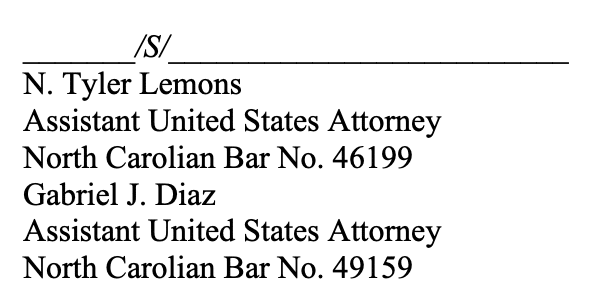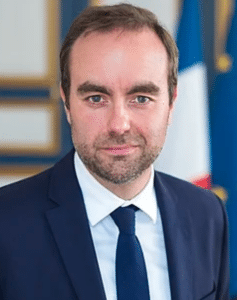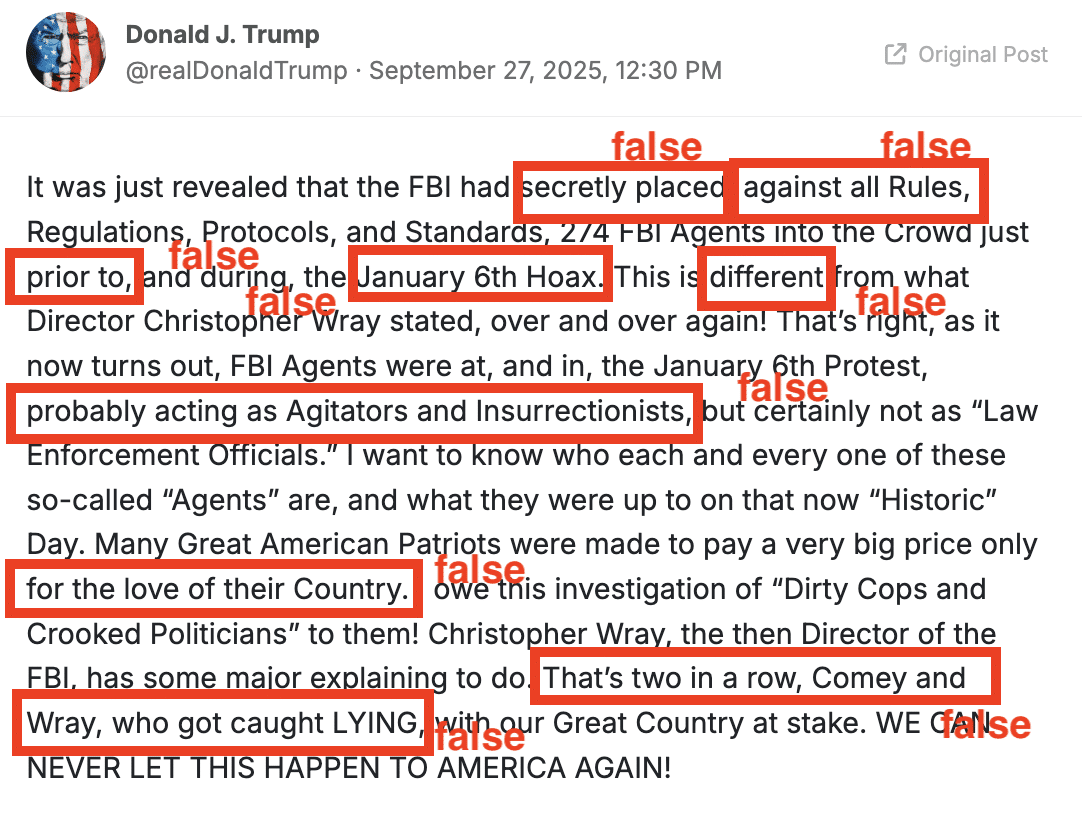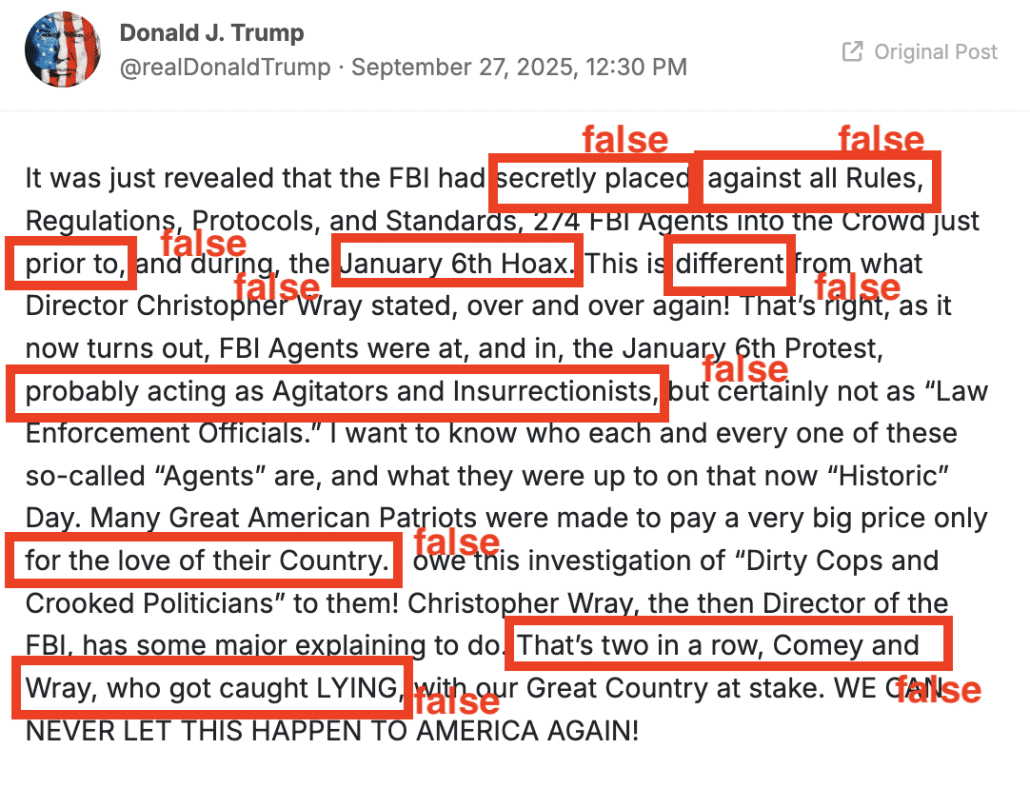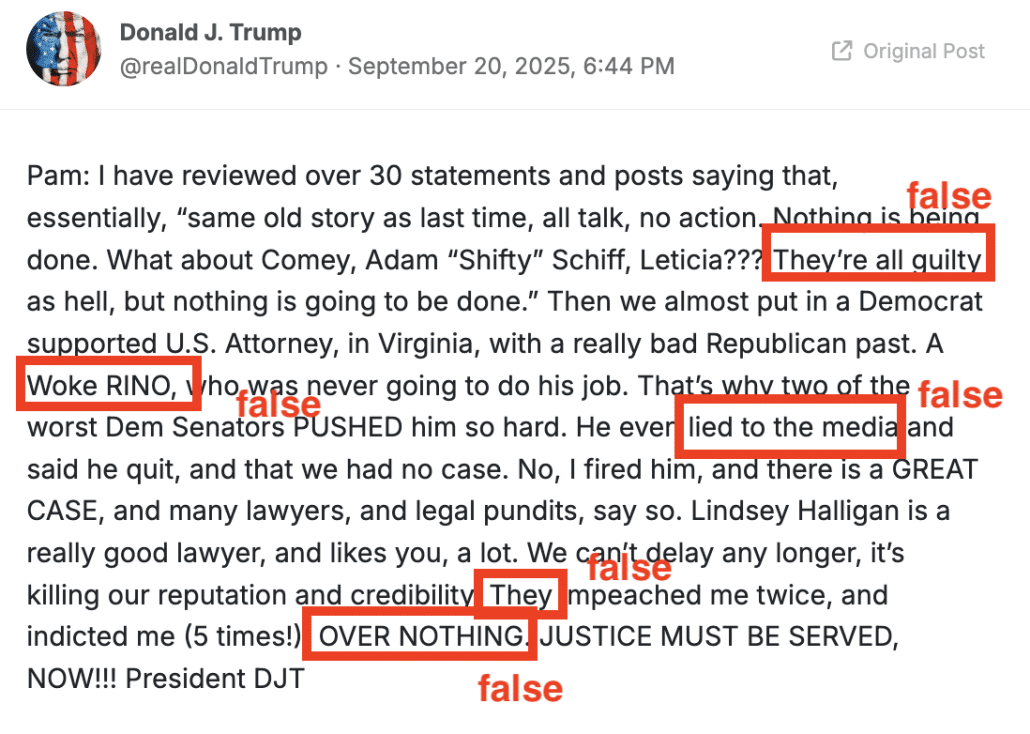Donald Trump indicted Jim Comey (and Tish James, and probably John Bolton next) not just because he is wracked by a compulsion to humiliate the people who have the temerity to suggest the justice system should apply to him, too. His fascist project also requires him to completely replace rule of law with corruption, as part of a tool to enforce loyalty.
But as he betrayed in the Truth Social post to Pam Bondi that he accidentally posted publicly, he also did so because his rubes are growing impatient.
I have reviewed over 30 statements and posts saying that, essentially, “same old story as last time, all talk, no action. Nothing is being done.
Donald Trump has sold his rubes on a promise of “justice:” that those he has demonized will be be branded criminals not just in Trump’s propaganda, but by the legal system as well. The nativists were getting restless that he had yet to deliver and so Trump was under pressure and that’s part of why he pressured Bondi in turn.
It’s not just Trump’s pathologies that demanded these indictments; it’s also the impatience of a very dangerous mob.
With the impatience of Trump’s mob in mind, I want to look at what the Comey arraignment suggests the rhythm of this particular prosecution will go.
EDVA’s rocket docket
EDVA has what’s called a “rocket docket,” an expectation that cases go to trial as quickly as possible and that the trial be as short as possible. On its face, a rocket docket could disrupt Trump’s need to feed his rubes, because it would hasten the moment when the whole thing is exposed as a fraud.
But it also poses a problem because the professionals who will take over this prosecution from Lindsey Halligan — Raleigh AUSAs Tyler Lemons (who took the lead at the arraignment) and Gabriel Diaz — only filed their notices of appearance on October 7, the day before arraignment, and when Patrick Fitzgerald reached out to them, they were completely unprepared to describe even the most basic aspects of the charges against Comey.
Unsurprisingly, the first thing Judge Michael Nachmanoff asked — after Fitzgerald entered a plea of not guilty for Comey — was to ask what date speedy trial would require a trial, which both Fitzgerald and Nachmanoff agreed would work out to be December 17.
When Nachmanoff asked if the case could go to trial by then, Fitzgerald skipped a step, immediately describing that he had sent a letter to prosecutors laying out his theory of defense and a two-phased set of motions he planned to file. He described the first — a Selective and Vindictive prosecution challenge and a challenge to Lindsey the Insurance Lawyer’s appointment — to be submitted on October 20. As Fitzgerald described, “our view is that this prosecution was brought at the direction of President Trump to silence a constant critic of him and, “we think [Halligan’s appointment] is an unlawful appointment.” He was less sure about what he would file ten days later, on October 30, but suggested a Bronston literal truth defense motion (the basis for which Anthony Trenga threw out one charge against Igor Danchenko in this same district), a grand jury abuse motion, and an outrageous government conduct motion.
Selling a Lemons CIPA dodge
Lemons used Fitzgerald’s explanation that he would like to exclude 31 days of time from Speedy Trial to insinuate Fitzgerald had suggested Comey needed time to prepare for trial, only to then confess he was not prepared to prosecute the case. “Part of it is obviously honoring the defense’s request for the later trial date and understanding and wanting them to be — have the time adequate to prepare for trial, but also in — it’s no discredit to Mr. Fitzgerald. He’s not — and we’re just getting our hands around the discovery as well.” But he also pointed to “a large amount of discovery which also includes classified information” for the request for more time.
Let me interrupt and note that the most recent ABC piece disclosing concerns the EDVA prosecutors had about the case included the amount of information the government would have to share with Comey.
Prosecutors further expressed concerns about the department’s ability to take the case to trial quickly due to problems identifying all the relevant materials that would need to be handed over to Comey’s lawyers, sources said.
As described, this is not about classified information (though I don’t doubt there’s a fair amount of materials on the SVR files believed to be at the heart of Dan Richman’s involvement). So it seems likely that Lemons is leaning on classified information as a way to stall.
Nevertheless, my sense is this is when things began to get a bit tense in the hearing, not least because it made it important for Fitzgerald to put on the record how unprepared the prosecution team was, but also because it raised the hackles of an EDVA judge about an interloper coming in and refusing to comply with rocket docket considerations.
Fitzgerald used it as an invitation to repeat that prosecutors had not yet told him who the people described in the indictment were (a complaint he made in different form at least three times). But — as a guy who has presided over some of the most difficult CIPA processes in history — he also scolded prosecutors for putting the cart before the horse, charging before making sure spooks would be willing to declassify intelligence to make a criminal case (not coincidentally, something John Durham did too).
We would have thought in the normal course when the government brings a case, they address the classified information issues ahead of time, coordinate within the national security section, and have a plan. And, frankly, we feel like in this case, the cart may have been put before the horse, and my client would not like to wait around unnecessarily while they go through things we think that should have been done before.
For his part, Nachmanoff used the CIPA excuse as an opportunity to order prosecutors to get Fitzgerald clearance as quickly as possible and to conduct the fastest CIPA process in history. “Either it’s not relevant to the case or it can be declassified or we will go through the fastest CIPA process you have ever seen in your lives.”
Donald Trump’s clearance tantrums
There are two surprises that may arise out of this focus on CIPA, even ignoring Nachmanoff’s impatience with it.
Nachmanoff only described getting Fitzgerald clearance (he noted that Jessica Carmichael, the only attorney of the five present who was currently practicing in EDVA, “has had a number of national security cases in this district in the last few months”). He did not mention Comey getting clearance.
That said, it is customary in CIPA cases to give a defendant clearance if he had clearance to access the materials at issue in a case during the period of the alleged crime — that’s the standard adopted, for example, by Aileen Cannon in the stolen documents case.
If Comey wanted access to this material — and there’s good reason to argue he should — then it might create a conflict between prosecutors (including Lindsey the Insurance Lawyer) and Trump, because one of the areas where a purportedly unreviewable Presidential authority has come under challenge is in legal cases, where the government has tried to moot a legal case by denying someone clearance.
That is, this trial might force Trump to agree to give Comey clearance, something he has stripped from all his adversaries.
But Comey might have reason not to pursue it: because of the even more abusive case Jack Eckenrode is attempting to build in WDVA.
Jack Eckenrode, WDVA, and John Durham’s discovery woes
Last week, one of the FBI agents purged by Kash Patel, Michael Feinberg, described that one of two FBI agents on this case was, “John Durham’s factotum and enforcer,” which via this link he confirmed to mean Jack Eckenrode.
The significance of Eckenrode’s role in this case has received far too little attention. As late as Scooter Libby’s indictment, Eckenrode was a key investigator on Fitzgerald’s CIA Leak case team. But then, as multiple people got leaked information about Karl Rove being imminently indicted, he wasn’t anymore. He and Fitzgerald (and Comey, as the link above notes) go way back, but there’s also a decent chance that Fitzgerald has reasons to know that Eckenrode leaked details of that earlier investigation to pressure him to expand the charges.
And, as Feinberg noted, Eckenrode was Durham’s right hand man, which makes Durham’s testimony (also reported by ABC) pretty awkward.
John Durham, the former special counsel who spent nearly four years examining the origins of the FBI investigation into President Donald Trump’s 2016 presidential campaign and its alleged ties to Russia, told federal prosecutors investigating James Comey that he was unable to uncover evidence that would support false statements or obstruction charges against the former FBI director, sources familiar with the matter told ABC News.
Federal prosecutors in Virginia met remotely with Durham in August to understand the findings of his investigation, according to sources familiar with the meeting, and his conclusions raise the prospect that Durham — who was once elevated by Trump and other Republicans believing he would prosecute high-level officials involved with the investigation of the president’s 2016 campaign — could now become a key figure aiding Comey’s defense.
But Eckenrode is also, per the NYT, the lead investigator in an investigation in WDVA premised on what seems to be a theory that FBI agents hid documents in a burn bag to protect people like Comey.
And that suggests a certain logic to the charges as originally packaged (which Lindsey the Insurance Lawyer fucked up and caused to be released). Lindsey the Insurance Lawyer, coached by Eckenrode, first tried to get the grand jury to approve three charges:
- One false statement charge claiming Comey lied when he couldn’t remember what Durham and Eckenrode, with the collusion of Kash Patel and John Ratcliffe, falsely packaged up into a “Clinton Plan” to frame Donald Trump (this is the one the grand jury rejected)
- Another false statement charge claiming Comey lied when he answered (he didn’t really) that he had not authorized anyone to speak to the press anonymously for him, which at some point meant Dan Richman sharing information about SVR documents suggesting that Loretta Lynch was helping Hillary dodge the email investigation
- An obstruction charge arising out of those lies (and now, the single charged lie)
That is, the original theory of the case (and unless the new prosecutors pull a wild headfake to try to salvage the case, still the theory) was directly relevant to the WDVA case. The idea being, you “prove” in EDVA that Jim Comey was lying in 2020 about his knowledge of multiple SVR documents, which you then use to build a case in WDVA that the FBI was conspiring to protect an effort in 2016 to focus on Trump to the exclusion of Hillary.
This is a direct replay of the strategy that Durham (who debunked the current charges) adopted (working with Eckenrode) in 2021, when he attempted to hang conspiracies around two thin false statement cases against Michael Sussmann and Igor Danchenko. You use the false statement to prove a motive for the conspiracy.
You also use one case — as Durham did with privilege challenges in the Sussmann case to obtain records that might have been pertinent to the Igor Danchenko case if they had said what his fervant fever dreams imagined they might — to attempt to obtain evidence for the larger case.
What’s worth knowing, though, is how classification stymied Durham’s case but also — thus far — protected his collusion with Russian spies. First, in 2020 (literally leading up to the Jim Comey testimony for which he has been charged), Ratcliffe and Kash “declassified” a bunch of documents in a misleading way to substantiate their “Clinton Plan” fabrication, pretty much reversing the meaning of the documents. That then formed the backbone of the Durham investigation. But Durham only shared still-classified SVR documents with a few subjects of the investigation, like Julianne Smith. He showed targets, like Peter Strzok, the misleadingly redacted documents (indeed, that’s what the question to Comey they wanted to charge would have been based on). There was a CIPA process with Sussmann, but I’m convinced they didn’t give him adequate substitutions, because otherwise he would have argued that they were framing him with fabricated documents.
The important detail is that Durham tried to coerce testimony from targets, undoubtedly including Comey, that would have required granting them clearance for such testimony. Witnesses could and some did avoid testifying by refusing to accept clearance — the same thing that the US Attorney in Philadelphia is using with a credulous Marc Caputo to excuse his inability to charge John Brennan.
Of course, to the extent that prosecutors who know none of this background have been dragged into this at the last minute, they may be forced to provide Fitzgerald, at least, with the proof that Eckenrode is still chasing decade old Russian disinformation. They’re just getting their hands around the discovery as well, Lemons explained.
They may in fact hand Fitzgerald evidence that Eckenrode committed the crime he wants to frame Jim Comey of doing.
Lindsey Halligan won’t say who she represents
There were two other details of from the arraignment that didn’t get enough attention, in my opinion.
First, here’s how the introductions went down. Lemons, the AUSA taking the lead, spoke first, greeting Judge Nachmanoff and describing his client in the standard manner. “Good morning, Your Honor. Tyler Lemons for the United States government.”
Lindsey the Insurance Lawyer went next. Not only did she not greet the judge, but … she didn’t tell us who she represents. “Lindsey Halligan,” was all she said.
After Gabriel Diaz introduced himself in the normal fashion (greeting, then describing that he represents the US), Fitzgerald gave the answer that made all the press reports (probably by design): “Good morning, Your Honor. Pat Fitzgerald, and it’s the honor of my life to represent Mr. Comey in this matter.”
Carmichael, the only one currently practicing in EDVA, also gave the standard answer. “Good morning, Your Honor. Jessica Carmichael for Mr. Comey.”
Given that the only times Lindsey the Insurance lawyer has represented anyone in federal court before, she introduced herself as representing Donald Trump, perhaps it was just safer for Lindsey the Insurance Lawyer to say as little as possible.
More interesting, however, is that Nachmanoff was not playing dumb to the problems with Lindsey the Insurance Lawyer’s presence. After Fitzgerald described his plan to challenge Lindsey the Insurance Lawyer’s appointment, Nachmanoff described — having already checked — what the procedure would be. “[A]ny motion to disqualify Ms. Halligan will be heard by an out-of-district judge,” Nachmanoff explained. “That is the process that has been followed in New Jersey and Nevada, and the Court will follow that process here, which means that a request will be made to Chief Judge Diaz of the Fourth Circuit to appoint an out-of-circuit judge only to address that issue.”
He came prepared for this issue.
As Nachmanoff moved onto a discovery order, Fitzgerald pointed to a piece of discovery he wants right away. “[W]e would like to see the appointment papers forthwith. We don’t want to be shooting at the wrong target” on the disqualification motion. Fitzgerald, who has had all manner of DOJ appointments in his day (once, on Jim Comey’s orders) noted “that most appointment papers for United States attorneys are a page or two, we would ask if we could have that forthwith” so that they could start drafting their motion.
In multiple cases when the Trump Administration tries something funny (as with the Illinois invasion, in which DOD fucked up the authorizing paperwork at least three times), they often don’t have their paperwork in order.
Which is to say, even before the reports out today that Lindsey didn’t consult with ODAG on public integrity concerns about indicting Tish James, DOJ may not have their ducks in a row.
Even as it is, Trump’s indictments of Comey and James have only worked within the narrow bubble of his frothers. In the wider world, they have focused increasing attention on his corruption. But by putting two prosecutors with absolutely no understanding of this background, to say nothing of the real ethical hazards involved in this case, they made it much easier for Fitzgerald to flip the table, to appear as if he is the one doing the prosecution, not them.

